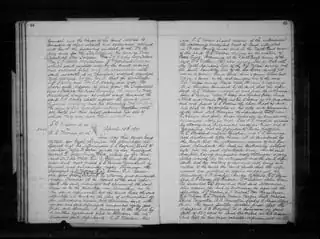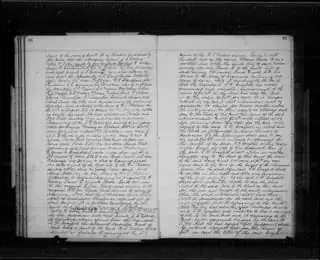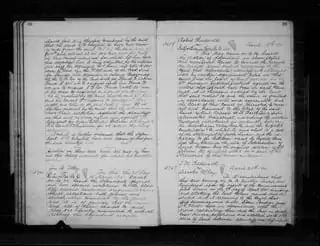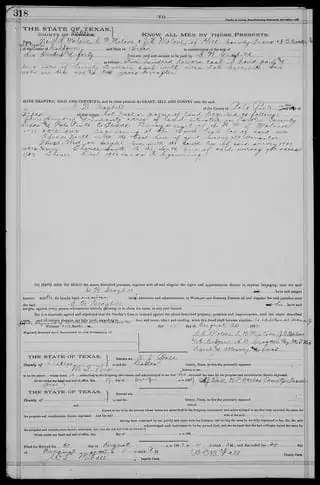How may I go about getting this case?
UPDATE: Glad to see that others have found the data. Best of luck!
The Final Decree Is Probably Easy To Obtain
The final decree is the case is probably recorded in the real property records of the county in question (it is fairly likely that the lis pendens giving notice of the filing of the case, and possibly also a document releasing the lis pendens when the case was concluded, are also in the public real property records). It would be cheap (relative to the cost of anything else you are contemplating) and easy to get a copy of the final decree and any and all other recorded documents related to that parcel of real property from a local title company, and they could email a copy to you.
An alternative to using a title company is to hire a "land man". A "land man" is an unlicensed independent paralegal, who usually does work for oil and gas companies and their lawyers for oil and gas title opinions, or for water rights lawyers. Land men are skilled in searching real estate title records and court records pertinent to real estate title for particular parcels of real estate. They then turn over their raw search result to some sort of real estate, oil and gas, or water rights lawyer for analysis of the state of the title to determine if there are any loose ends or ambiguities in the title that have to be cleared up to make the title marketable.
Lawyers are involved because title companies typically refuse to insure oil and gas title or title to water rights, so in real estate deals where this is material, the parties rely on a title opinion from a lawyer instead.
The Court File Has Probably Been Destroyed
If it hasn't been destroyed, the court file is probably in the custody of the clerk of the court in question, or its successor, in deep paper storage, in either a bankers box or on microfiche. If those records were transferred to some archive, the clerk of that court or of the successor court should be able to tell you (probably by phone).
But it is much more likely to have been destroyed.
In all likelihood, everything else besides the final decree has been destroyed.
The parties filings other than the final decree, but including the reasoned order of the judge, would have bee kept at the court clerk's office for a couple of decades and then probably destroyed.
The Lawyer's Files Were Probably Destroyed And Are Confidential If They Still Exist
The written depositions were probably in the custody of the lawyers, but never filed with the court. The court reporters who swore in the deponents wouldn't almost never keep a copy for more than a few years.
The lawyers' files were probably destroyed no later than when the law firms shut down (if the lawyers were sole practitioners, as would have been most common in rural Texas in 1901, probably upon their deaths). If the didn't shut down, the depositions and lawyer's files were probably destroyed either shortly after the case was truly a final judgment with all possibility of appeal exhausted, or perhaps a decade or so later, if they were saved against the risk of future litigation of some kind.
Also, the lawyers couldn't legally disclose their files (or event the existence of their files), if they still had them, without the consent of the successor to their clients. Attorney-client privilege (or more pertinently, the parallel duty of a lawyer to keep all client information confidential, whether or not it is attorney-client privileged) survives the death of both the lawyer and the parties to the case. Disclosing these files 123 years later without client successor consent probably wouldn't get the lawyer disbarred or suspended, but it probably would result in an admonition or other black mark on their official permanent public disciplinary record and quite possibly an order to go to ethics school to relearn the rules about client confidentiality.
A Successor Of The Client Might Have The Lawyer's File
There is a small possibility that the lawyers for one or both sides turned over their files to the parties who were litigating the case, and that those files were then retained by the families as family history and still exist today. Indeed, that is the most likely scenario in which these records would still exist. But the odds of that having happened at all are maybe 10-15%, and the odds that those records still exist 123 years later are maybe 1-5%, depending upon how historically notable the case was and how historically notable the owners of the land were. The odds are a little better if one of the parties to the case were someone famous whose personal documents may have been turned over to a library or archive, or if one of the parties was some sort of non-profit organization that has kept its records forever.
Will it be an online data base that lawyers have access to?
There is a chance that the existence of the case will be noted in a surviving index of cases that was digitized. This would be the only online data that would be available, if there is any (and the details in the question suggests that it isn't). It is more likely that the index of cases from 1901 exists only in paper form, or on microfiche, if it exists at all. There is a good chance that even the index of cases from then was destroyed.
is it hopeless to think that this case will be online?
Yes. Online data is only very rarely available for legal matters before the 1960s and often doesn't start until the 1990s or 2000s. Rural Texas doesn't have a reputation for being exceptionally good about archiving very old legal documents online.
But if you were miraculously lucky, maybe some local college professor, or historical society, went above and beyond the standard found in 99% of the U.S.
Can I obtain it on my own, or would I need to get a lawyer to get it?
If it exists at all, you wouldn't need a lawyer. If it was a public record that still existed, you wouldn't need anyone's consent. If it was in a lawyer's custody, you would need the consent of the successor to the client. You don't have any legal right to the documents if they are not found in public records.
Footnote
I do have some familiarity with this kind of work.
In addition to being a lawyer, in Colorado and New York State, I was a history minor in college and did a fair amount of archival research in that capacity for a senior project. My wife did historical research for a master's thesis that I helped her out on in some technical details, and she was an employee of the University of Michigan library system for a while. I have also done some amateur genealogy work. And, I was a radio news reporter in college, and was a professional print journalist for an online magazine around 2008-2010ish.
One of my first cases as a sole practitioner in greater Buffalo, New York, was title work for a restaurant building that was being sold that had about a dozen unrecorded deeds between the last record owner and the current owner that had been maintained and authenticated by Taiwanese notaries that has to be translated from legal terminology in Taiwanese Mandarin into English and then domesticated. This also required a full title search back to (and before) one of its previous owners, our 13th President, Millard Fillmore, complete with his recorded affidavit from the early 1800s that he didn't have a common law wife who could claim rights in the property.



